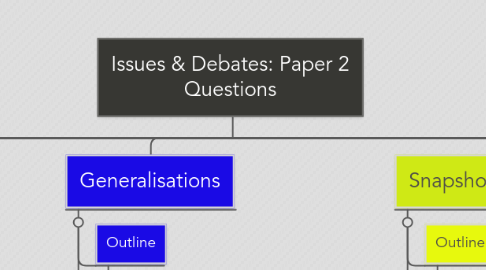
1. Usefulness
1.1. Outline
1.1.1. Outline what is meant by ‘application of psychology to everyday life’. [2]
1.2. Evaluate
1.2.1. What problems may psychologists have when they try to create useful studies? [9]
1.2.2. What advantages may psychologists have when they try to make studies useful? [9]
2. Ecological Validity
2.1. Outline
2.1.1. Outline what is meant by the term ‘ecological validity’. [2]
2.2. Evaluate
2.2.1. What problems may psychologists have when they try to make studies ecologically valid? [9]
3. Ethics
3.1. Outline
3.1.1. Outline what is meant by the term ‘ethical guideline’. [2]
3.1.2. Outline one ethical issue. [2]
3.2. Evaluate
3.2.1. What problems may psychologists have when try to make their studies ethical? [9]
3.2.2. What advantages may psychologists have when they make studies ethical? [9]
4. Nature/nurture
4.1. Outline
4.1.1. Outline what is meant nature and nurture in psychology. [2]
4.1.2. Outline what is meant by the ‘nature-nurture debate’ in psychology. [2]
4.2. Evaluation
4.2.1. What are the problems for psychologists when investigating whether behaviour is due to nature or nurture? [9]
4.2.2. What advantages may psychologists have when they investigate the nature-nurture debate? [9]
5. Psychometrics
5.1. Outline
5.1.1. What is meant by a psychometric test? [2]
5.2. Evaluate
5.2.1. What are the advantages of using psychometric testing? [9]
6. Quantitative/Qualitative
6.1. Outline
6.1.1. Outline what is meant by ‘qualitative data’. [2]
6.1.2. Outline what is meant by the term ‘quantitative data’. [2]
6.2. Evaluation
6.2.1. What problems may psychologists have when they collect qualitative data? [9]
6.2.2. What problems may psychologists have when they collect quantitative data? [9]
6.2.3. What problems may psychologists have when their research has only quantitative or qualitative data? [9]
7. Generalisations
7.1. Outline
7.1.1. What is meant by the term ‘generalisations’? [2]
7.2. Evaluation
7.2.1. What problems may psychologists have when they make generalisations from psychological research? [9]
8. Snapshot/longitudinal
8.1. Outline
8.1.1. Outline what is meant by the ‘snapshot method’ in psychology. [2]
8.1.2. What is meant by the ‘longitudinal method’? [2]
8.2. Evaluation
8.2.1. What are the advantages for psychologists when carrying out studies using the snapshot method? [9]
8.2.2. What problems may psychologists have when they use the snapshot method? [9]
8.2.3. Discuss the strengths and weaknesses of using the snapshot method to investigate brain activity. [10]
9. Children
9.1. Outline
9.1.1. Outline why children are used in psychological research. [2]
9.2. Evaluation
9.2.1. What problems may psychologists have when they investigate developmental processes in children? [9]
9.2.2. What problems may psychologists have when they use children in psychological research? [9]
10. Animals
11. Reductionism
11.1. Outline
11.1.1. Outline what is meant by the term ‘reductionism’. [2]
11.2. Evaluation
11.2.1. What are the advantages of using a reductionist explanation for psychologists? [9]
12. Ethnocentric Bias
12.1. Outline
12.1.1. Outline what is meant by the term ‘ethnocentric bias’ in psychology. [2]
12.2. Evaluate
12.2.1. What problems may psychologists have when they try to avoid ethnocentric bias in their research? [9]
13. Reliability/Validity
13.1. Outline
13.1.1. Describe different types of validity in psychology. [5]
13.1.2. What is meant by reliability? [2]
13.2. Evaluate
14. Individual/Situational
14.1. Outline
14.1.1. Outline what is meant by the term ‘individual differences’. [2]
14.1.2. Outline what is meant by the term ‘situational explanations of behaviour’ in psychology. [2]
14.2. Evaluate
14.2.1. What problems may psychologists have when they try to investigate individual differences? [9]
14.2.2. What problems may psychologists have when they investigate the effects of situations on behaviour? [9]
14.2.3. What are the advantages of investigating individual differences? [9]
14.2.4. What advantages may psychologists have when they investigate situational explanations of behaviour? [9]
